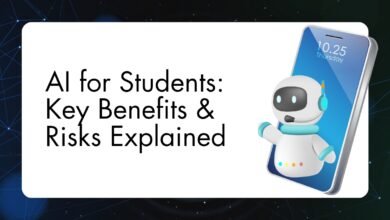AI in Healthcare & Fitness: Benefits, Uses & Future Impact
Discover how AI is transforming healthcare and fitness—from smart diagnostics to personalized workouts and wellness tracking. Learn benefits & future trends.

Introduction to AI in Healthcare
Artificial Intelligence (AI) has emerged as a pivotal force in the evolution of the healthcare sector. Defined as the simulation of human intelligence processes by machines, particularly computer systems, AI encompasses a variety of technologies, including machine learning, natural language processing, and robotics. The application of these technologies is reshaping healthcare delivery by providing innovative solutions to longstanding challenges faced by both providers and patients.
Machine learning, a subset of AI, utilizes algorithms and statistical models to analyze and interpret complex data sets. In healthcare, this capability enables the identification of patterns within vast amounts of patient data, which can lead to improved diagnostics, personalized treatment plans, and predictive analytics for future outcomes. For instance, AI models can analyze medical images, detecting anomalies with remarkable accuracy. This not only enhances diagnostic precision but also allows healthcare professionals to focus on patient care rather than manual data interpretation.
Natural language processing (NLP) is another crucial component of AI in healthcare. By facilitating the interaction between computers and human language, NLP allows for the efficient handling of unstructured data from electronic health records and clinical notes. This capability streamlines documentation processes, enables better patient-practitioner communication, and enhances the overall efficiency of healthcare operations.
Moreover, robotics represents a significant area where AI is making strides in healthcare. Robotic systems assist in surgical procedures, rehabilitation, and even patient monitoring, providing precision and consistency that can surpass human capabilities. These technologies not only improve operational efficiency but also contribute to better patient outcomes through reduced recovery times and fewer complications.
In summary, the integration of AI technologies into healthcare settings signifies a transformative shift aimed at enhancing the quality of care delivered to patients. As innovations in AI continue to evolve, their implications for future healthcare practices will undoubtedly expand, offering substantial benefits to healthcare providers and patients alike.
Applications of AI in Healthcare
The applications of artificial intelligence (AI) in healthcare are diverse and impactful, significantly enhancing the way medical professionals diagnose, treat, and manage patient care. One of the most prominent applications is in diagnostics, where AI algorithms analyze medical imaging data to identify conditions such as cancer, fractures, and other abnormalities with high accuracy. For instance, Google’s DeepMind has developed AI systems that can outperform human radiologists in detecting breast cancer in mammograms, showcasing the potential of AI to improve diagnostic precision and outcomes.
Another critical area where AI is making strides is personalized medicine. Machine learning models analyze patient data, including genetic information, to tailor treatment plans that are specifically designed for individual patients. Companies like Tempus utilize AI to sift through vast datasets, facilitating the development of precision therapies that consider each patient’s unique genetic makeup, thereby increasing the likelihood of successful treatment.
In the realm of drug discovery, AI accelerates the process by predicting which drug formulations will be effective against particular diseases. For example, Atomwise employs AI technologies to analyze molecular structures, resulting in speedy identification of potential drug candidates, which can significantly reduce the time and investment involved in bringing new medications to market.
Additionally, AI-driven patient monitoring systems are revolutionizing how healthcare providers manage chronic conditions. Wearable devices powered by AI analyze biometric data in real-time, providing valuable insights into a patient’s health status and alerting healthcare professionals of any concerning trends. Companies like Biofourmis leverage AI for remote patient monitoring, ensuring timely interventions that can prevent hospitalizations.
Lastly, AI enhances operational workflow management within healthcare facilities. By automating administrative tasks such as appointment scheduling and billing processes, AI systems like Qventus streamline operations, allowing medical staff to focus more on patient care while improving overall efficiency. The transformative role of AI in these various applications illustrates its potential to significantly advance the healthcare landscape.
Benefits and Challenges of AI Integration in Healthcare
The integration of artificial intelligence (AI) into healthcare represents a significant advancement in the field, offering numerous benefits that can enhance patient outcomes and streamline medical processes. One of the primary advantages of AI is its ability to improve diagnostic accuracy. Machine learning algorithms can analyze vast amounts of medical data, leading to earlier and more precise identification of diseases such as cancer, thereby facilitating timely treatment. This capability not only aids clinicians but also enhances patient care through earlier interventions and tailored treatment plans.
Furthermore, AI can result in considerable cost reductions for healthcare systems. By automating routine tasks, such as data entry and scheduling, healthcare providers can allocate resources more efficiently and focus on patient care. Moreover, predictive analytics powered by AI can assist in anticipating patient needs and managing hospital resources, which can further optimize operational costs. Enhanced decision-making is another benefit, as AI tools, equipped with real-time data, can assist healthcare professionals in making informed decisions that lead to better patient outcomes.
However, the integration of AI in healthcare does not come without challenges. Data privacy remains a significant concern, as the handling of sensitive health information necessitates robust security protocols. Ethical issues also arise when deploying AI systems, particularly concerning decision-making processes that may lack transparency. Additionally, there is a risk of over-reliance on technology, potentially diminishing the role of human intuition in clinical settings. Lastly, disparities in access to AI-driven solutions could exacerbate existing inequalities within healthcare, limiting the benefits to those who may need them the most. Addressing these challenges is essential to fully harnessing the transformative potential of AI in healthcare while ensuring equitable access for all patients.
The Future of AI in Healthcare
The future of artificial intelligence (AI) in healthcare is poised to be both transformative and multifaceted. As technology continues to evolve, several emerging trends and innovations are expected to shape the landscape, enhancing the efficiency and effectiveness of healthcare systems worldwide. One significant trend is the integration of AI with telemedicine. This hybrid approach is anticipated to improve patient access to healthcare, especially in underserved regions, by facilitating remote consultations and monitoring through AI-driven applications.
Moreover, advancements in natural language processing (NLP) are likely to lead to enhanced patient data management. AI systems are increasingly capable of processing vast amounts of unstructured data, including patient records and clinical notes, to derive actionable insights that can inform treatment decisions. This capability could streamline workflows for healthcare providers and improve patient outcomes by enabling personalized medicine tailored to individual health profiles.
Regulatory frameworks are also expected to evolve, accommodating the growing influence of AI technologies in healthcare. Policymakers will need to address concerns surrounding data privacy, cybersecurity, and ethical AI use to balance innovation with patient safety. Experts suggest that as AI tools gain prominence, there will be an increased focus on developing guidelines that ensure compliance and foster trust among healthcare providers and patients.
Additionally, the role of AI in addressing global health crises cannot be overstated. During pandemics, AI has proven invaluable for tracking disease spread, optimizing resource allocation, and developing targeted treatment protocols. Anticipated advancements in AI will further enhance its predictive capabilities, allowing for more proactive responses to health emergencies.
In conclusion, the intersection of AI and healthcare is set for significant advancements in the coming years. As we embrace these innovations, it becomes crucial to navigate the challenges and opportunities presented, paving the way for a more efficient, effective, and patient-centric healthcare system.



